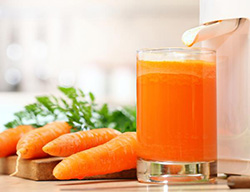Does juicing really work?
 It seems like juicing is on everyone’s lips these days. Celebrities like Gwyneth Paltrow advocate for a five to ten day detoxifying juicing programs that claim to help you “lose a few pounds of holiday excess.”
It seems like juicing is on everyone’s lips these days. Celebrities like Gwyneth Paltrow advocate for a five to ten day detoxifying juicing programs that claim to help you “lose a few pounds of holiday excess.”
Many companies are even offering juice-delivery services for those who are too busy to prepare their own recipes. But besides the idea of consuming fresh juice in order to substitute caffeine, alcohol or processed sugars, there is very little to no substantial benefit to juicing.
“When you’re juicing you’re removing a lot of foods from your diet. You’re not eating much protein, plus you’re eliminating fibre you get from your fruits and vegetables,” says Popi Kasvis, clinical nutritionist at the McGill University Health Centre (MUHC). “Juicing basically keeps you hungry as it just fills you with a lot of water and sugar. The sugar in juice is absorbed very quickly. In other words, a teaspoon of white sugar will enter your bloodstream as quickly as the sugar you get from your juice.”
But what about the idea of ‘purifying’ our bodies from processed and inflammatory foods that leave us with a bloating feeling? Well, according to Kasvis, there’s no real evidence that proves juicing is somehow going to ‘cleanse’ our system.
“Our bodies have two wonderful organs: the liver and the kidneys, which really take care of all the toxins,” she explains. “If you juice you’ll probably start losing weight, but it’ll be muscle instead of fat. Plus, you’re not adding any protein to protect your muscles and satisfy your hunger. So other than the placebo effect and thinking ‘wow, I feel clean and I’ve gotten rid of all these toxins’, there’s no real benefit to juicing diets.”
A matter of balance
If you’re one of those people who have set their New Year’s resolutions and are planning on losing a few extra pounds in 2015, you should stay away from the short-cuts of juicing and detox diets and start incorporating more fresh, organic and raw fruits and vegetables into your daily lifestyle.
“Watching your portions is also crucial because the key is not to overeat. You want to satisfy your hunger in order to be less prone to snack on junk food throughout the day,” says Kasvis. “A good alternative to juicing would be a smoothie. First, you’re probably adding milk or yogurt for protein and you’re most likely using the whole fruit, so you’re automatically adding fibre to your mix. It would actually be a better meal replacement for those who are on the run,” she says.
So next time you’re tempted to try a new detoxifying regime that claims to help you shed the pounds in a matter of days, remember: only a well-balanced diet and an active lifestyle will give you the results you’re looking for and contribute to long-term health.